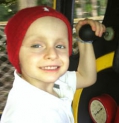Targeted regulation of acetylation as novel therapy for Ewing sarcoma.
Ewing's Sarcoma Family of Tumors (ES) are pediatric tumors of the bone and adjacent tissue. The over-all cure rate is 50-60% with significantly worse prognosis for patients who present with metastatic disease. In order to increase the number of patients who survive ES and to lessen the toxicity to those survivors, ES needs new therapy that goes beyond current chemotherapy. The current 'cytotoxic' therapy could be improved if medicines for ES were more precisely targeted to the ES cancer cells since this would spare the normal organs. We have recently developed a new class of chemicals specifically for ES based on its genetic abnormality, a translocation. This is the exchange of chromosomal fragments between chromosomes 11 and 22, which leads to the fusion protein EWS-FLI1. EWS-FLI1 is only found in ES cells and is essential for the maintenance of ES cell survival and tumorigenesis. This makes it a unique target for new therapeutic strategies.
Our laboratory has made the novel discovery that EWS-FLI1 is subjected to acetylation, a process cells use to modulate expression and function of proteins. Drugs called histone deacetylase inhibitors (HDIs) are currently advancing through clinical trials. There is evidence that HDIs are toxic to ES cells. This project will evaluate how acetylation affects EWS-FLI1. Our work will culminate by combining HDIs with novel EWS-FLI1 inhibitors that our laboratory is developing. This work has the potential to lead to therapies for ES that are significantly different, and potentially more targeted to ES cells than current cytotoxic therapy.

